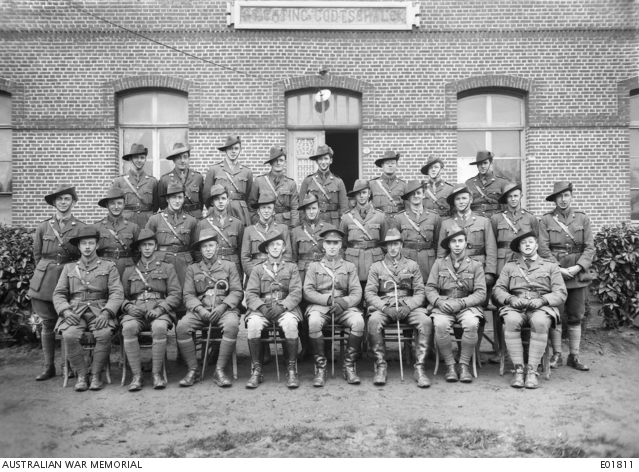Many Australians have performed extraordinary feats of bravery on battlefields around the world for over one hundred years, although most of them would claim they were not heroes, but that they were just looking after their mates.
Within the British honours system, the bravest are acknowledged with the Victoria Cross, such as Dimboola’s Rupert Moon, but those who received a Military Cross, Distinguished Service Order, or even a mention in dispatches will have also performed some outstanding actions.
With Australians involved in many significant battles on the Western Front between 1916 and 1918, awards from the French and Belgian, the countries in which this fighting occurred, are obvious, but other countries, including Italy, Serbia, and Montenegro also directly honours individual Australians.
Several Wimmera volunteers were acknowledged in this way, including the only member of his Battalion to receive an award from Italy, Lieutenant John Lance Foott.
Originally from Ballarat, Foott was living and working as a farm labourer at Willenabrina, east of Jeparit, when War was declared in early August 1914. By the 19th of that month, he was at Broadmeadows in Melbourne and enlisted to serve with the 8th Battalion alongside many other Wimmera recruits.
In a scene repeated in communities all over the country, multiple times in some, on 5 September Foott and twelve of his colleges returned from camp briefly to Warracknabeal to say goodbye to their family and friends, and enjoyed an official civic farewell functioned arranged by the local Shire President.
The Battalion sailed from Australia in October destined for further training in Egypt, and although the belief that they were on their way to join the fight on the Western Front in France, they saw their first action when they reinforced Indian troops protecting the Suez Canal after Turkish attempts to seize it. They didn’t engage the enemy during this operation, but they soon did when they took part in the landings on the Gallipoli peninsula on 25 April.
After only ten days at Anzac, they were transferred to Helles to participate in the Battle for Krithia before returning to Anzac Cove.
Foott was promoted to corporal in May, and in August suffered a shrapnel wound to the head from which he suffered a concussion and bruised face. This resulted in him returning to Egypt to recover.
On 7 November he re-joined the Battalion which at that time was stationed on the Greek island of Lemnos for rest and training. On 21 November they returned to Anzac and were only there for just under a month before being evacuated, along with all the Allied troops, to Egypt as the campaign was abandoned.
In early 1916 the Battalion transferred to France and in August when fighting near Pozieres, Foott was again wounded, this time it was a gunshot wound to his arm.
At the start of September, he was promoted to Company Sergeant Major and then Warrant Officer Class 2, but reverted to sergeant upon the return to the Battalion of a colleague who resumed his role as Warrant Officer.
In April 1917 he returned to hospital, and whilst there it was announced on 21 April than he had been awarded the Bronze Medal for Military Valour by the King of Italy for ‘distinguished services rendered during the course of the campaign.’
Unfortunately, although this award was listed in both the London and Commonwealth Gazettes (the usual place such awards were officially announced) the full citation is not available, so it is unclear precisely for which action he was awarded this.
He returned to action in the middle of May and was promoted to Second Lieutenant by the end of July.
Foott’s name appeared in a local advertising campaign back in Australia encouraging eligible men to volunteer to replace those who were amongst the First Division of the AIF to leave for the War who had by this time been serving for one thousand days. The aim was to replace all these original veterans and allow them to return home for Christmas. Unfortunately, this campaign did not achieve this aim and Foott, and many of his colleiges remained ion active duty in France.
A third visit to hospital on 10 November came after he was hit with mustard gas during fighting at Westhoek Ridge, east of Ypres in Belgium. This kept him off the front line for a week.
His promotion to Lieutenant came through in March 1918.
His fourth visit to hospital came on 14 April when he was wounded in action for a third time, near the village of Vieux-Berquin in France. Ironically during a German artillery barrage, he had his foot injured which resulted in it being amputated.
This injury saw him transferred to England to recuperate, and by the end of June, he was finally on his way back to Australia.
Upon his return, he was honoured with a well-attended social function to welcome him home and acknowledge his service and sacrifice on 17 October 1918 in the Willenabrina hall - just over four years after he had been farewelled in September 1914.
During this evening Foott was presented with a certificate from the Shire, a suitably inscribed gold medal and a wallet of notes, but the most significant part was when he had the large crowd silent for more than half an hour as he recounted some of his battlefield experiences.
Upon his discharge from the army, Foott returned to the Willenabrina district before purchasing land at Litchfield, near Donald, where despite his wartime injury, he farmed with his wife until their retirement in the early 1960s.
He passed away peacefully in the Donald Hospital in June 1965, fifty-five years ago, as one of the true Australian heroes who lived a full and rewarding life, despite the horrors he endured during those four years serving abroad, and the life-altering injuries he suffered.
As a sign of the respect in which John Foott was held as both a member of the community and as a former soldier, St Mary’s Church in Donald was filled to overflowing for his funeral with friends and family from many parts of Victoria, and the funeral procession involved 128 cars travelling from the church to the cemetery.
A guard of honour was formed at the church by RSL members and 150 students from St Mary’s School, and another at the cemetery included 40 RSL members and 30 members of the Holy Name Society.
All three of John’s brothers also served overseas during World War One.
Another Wimmera local who served in the 8th Battalion to receive a foreign honour was Lieutenant Colonel John Wesley Mitchell. Born at Tarranyurk and living in Warracknabeal at the outbreak of the War, Mitchell received the Belgian Croix de Guerre for his service whilst commanding the Battalion. He was also awarded the Distinguished Service Order and Bar and was mentioned in dispatches on five occasions.

Above - Officers of the 8th Battalion in February 1918 - Lieutenant John Lance Foott (Italian Bronze Medal for Military Valour) is second from the left in the second row, and Lieutenant Colonel John Wesley Mitchell DSO and Bar is fifth from the left in the front row. - Australian War Memorial photo
|





